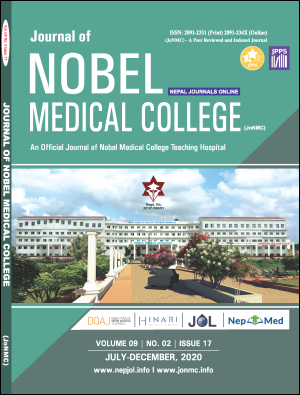Postpartum Depression and its Associated Factors among Postpartum Mothers Attending a Teaching Hospital in Eastern Nepal
DOI:
https://doi.org/10.3126/jonmc.v9i2.33395Keywords:
Mothers, Postpartum depression, PrevalenceAbstract
Background: Postnatal depression is an important and burning public health issue in modern civilization with the strongest connection to adverse outcome for children and also maternal morbidity. The objective of the study was to determine the prevalence and factors associated with postpartum depression among postpartum mothers attending Nobel Medical College Teaching Hospital.
Materials and Methods: A descriptive, cross-sectional study was conducted in Immunization Clinic of Nobel Medical College Teaching Hospital. A total of 178 postpartum mothers with a period of six to fourteen weeks after delivery were selected by using non- probability consecutive sampling technique. Data was collected by using Edinburg Postnatal Depression Scale. Association between variables was measured by Chi-square test and binary logistic regression analysis was performed to determine the prevalence and factors associated with postpartum depression among postpartum mothers
Results: The prevalence of postpartum depression among postpartum mothers was 30.3%.Amongst various variables, age of the women, religion, educational level, occupation, monthly income, type of pregnancy, parity, problem during pregnancy and delivery, infant health problem, marital satisfaction and stressful life events in previous year were significantly associated with postpartum depression.
Conclusion: The number of postpartum mothers experiencing postpartum depression was high. Early screening of depressive symptoms and counseling of postpartum mother should be included in routine antenatal and postnatal care services; so that, maternal morbidity and adverse child outcomes can be prevented.
Downloads
Downloads
Published
How to Cite
Issue
Section
License
JoNMC applies the Creative Commons Attribution (CC BY) license to works we publish. Under this license, authors retain ownership of the copyright for their content, but they allow anyone to download, reuse, reprint, modify, distribute and/or copy the content as long as the original authors and source are cited.




